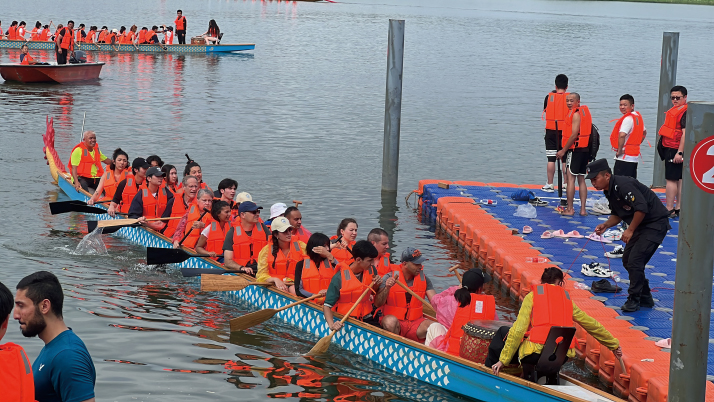| China |
| Take a dive into one of China's most interesting water-based traditions | |
|
|
 A team of international experts and students from all over China participates in the Miluo International Dragon Boat Invitational Race in Miluo, Hunan Province, on June 20 (COURTESY PHOTO)
The Dragon Boat Festival—Duanwu Jie—honors a famous episode in China's long history. In the U.S., the festival remains largely unknown and I had not heard of it before coming to China eight years ago. Moving here has opened my eyes to fascinating cultural tales and holiday traditions. This festival, celebrated on the fifth day of the fifth month of the lunar calendar, is certainly one of the most fun. During the late Warring States Period (475-221 B.C.), Qu Yuan, a highly regarded poet and government minister of the Kingdom of Chu, was exiled after the Chu ruler ignored his advice on forming an alliance with a neighboring state to strengthen their resistance to military advances by the Kingdom of Qin. This eventually led to conquest by Qin in 223 B.C. and surrender to its ruler, who would go on to become China's first emperor, Qin Shi Huang, later buried with his now-famous army of life-sized terracotta soldiers in Xi'an, capital of Shaanxi Province. According to local legend, when the news of a military defeat of the Chu reached Qu Yuan in his exile in 278 B.C. in what is now Hunan Province, he drowned himself in the Miluo River in a fit of patriotism and despair. Upon learning the news, villagers dropped wrapped glutinous rice dumplings called zongzi into the river from boats as food for the fish to stop them from feeding on the dead poet's body. Since then, the anniversary of his death has been honored and dragon boat races have become a holiday tradition along with the zongzi. To mark the 2300th anniversary of his death, governments of Hunan and the city of Miluo held a cultural tourism festival this June and invited international experts and students from around China to take part in their authentic celebrations, which culminated in an exciting international dragon boat invitational race. The international visitors were divided into teams of 22 rowers and one drummer, and raced on four boats, with more serious Chinese teams competing afterward. Our team was quite global, including participants from Tunisia, Brazil, Russia, Spain, Britain and America. Our visit to Miluo began with a stop at the Quzi Memorial Temple dedicated to Qu Yuan and a nearby village that was holding a street fair featuring local foods, demonstrations of how to make the area's unique ox-horn-shaped zongzi, and entertaining songs that melded modern and traditional instruments. The friendliness and generosity of the villagers made everyone feel welcome. The locally made rice wine, mijiu, was pretty tasty, too. The morning after the fair, our team walked to the Miluo River International Dragon Boat Race Center to receive expert training on how to row a real dragon boat. After donning the required life jackets and choosing an oar, we went to the special floating docks where a racing specialist taught us how to properly get in the long, narrow boats and how to use our oars. Our chosen drummer kept the beat on a large drum at the front of the boat while we practiced rowing in unison, propelling the boat swiftly down the river for several hundred meters. In the evening, the opening ceremony for the 2300th-anniversary celebration and tourism festival began with a parade of performers on stilts, dressed in historical traditional costumes, and proceeded to colorful, beautifully choreographed dances, speeches, awards and the most anticipated event, a new musical based on Qu Yuan's life and death, Nine Songs, named for one of his most famous works. It was an enthralling tale spun through innovative sets, gorgeous costumes, exciting fight sequences and masterful special effects via projections on screens behind the stage. The actors held the audience spellbound with their acting and singing. And, yes, acrobatics! Some of the war scenes depicting Chu-Qin battles included beautifully choreographed acrobatic works. Although the audience knew ahead of time that the tale ends tragically, the scenario that emphasized his patriotism and sense of honor was still moving. The final scenes used projections of his calligraphic works in the background, bringing home his continued contributions to China's cultural traditions. On the day of the real races, our team suited up in matching sports gear and waited eagerly for our chance to race. Shortly before our time slot, we boarded our assigned dragon boat, paddled out to the racing lanes and took our spot. At the sound of the horn, we quickly began rowing to the beat, heading for the finish line 500 meters ahead. The racing was exciting and our arms were quite tired from rowing hard. A horn sounded as each boat crossed the finish line, and our racing times were noted. It was over so quickly. We went to the staging area to line up for the presentation of the awards and were able to see some of the remaining races. We could also see how much the local people liked the event as evidenced by the full crowd in the grandstands and the many spectators lined up along the river. Although our race time didn't net us a win, each group did receive a plaque noting their participation in the races. Miluo is definitely worth a trip to sample its traditions and charms. In addition to a beautiful memory of my adventures on and around the river and a bite of the spicy Hunan cuisine, I take home a deeper understanding of one of China's most interesting holidays, as well as a small book of some of the famous poet's works. (Reporting from Miluo, Hunan Province) (Print Edition Title: An Authentic Celebration) Copyedited by G.P. Wilson Comments to wanghairong@cicgamericas.com |
|
||||||||||||||||||||||||||||||
|